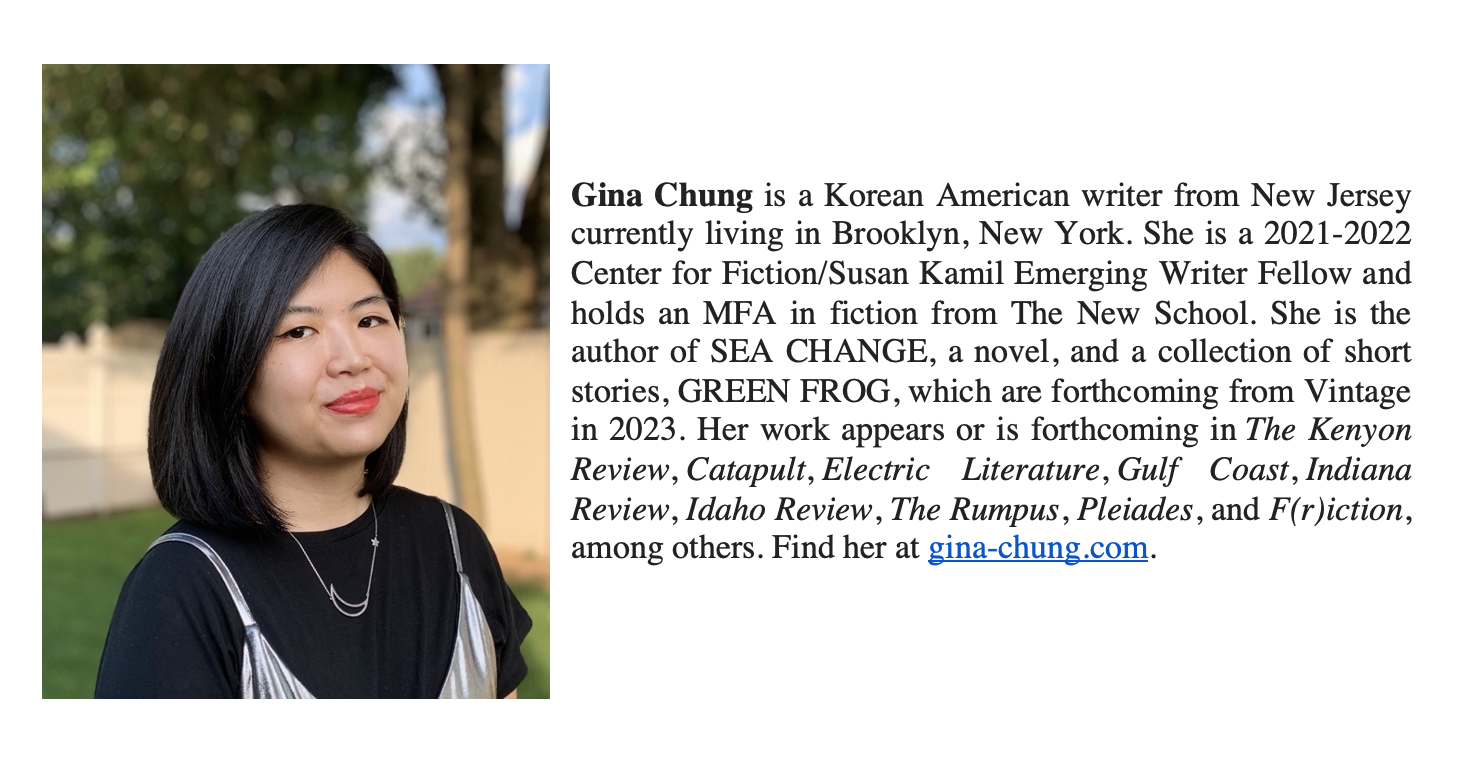Prose by Gina Chung
********************************************
Carried
My grandmother once told me that when she was a child, she was afraid of very little, and she was very practical. Her parents had died before she turned ten, and when the war came and the country was divided in two, she knew that there was nothing to do but run south, with whatever she could carry across that shimmering new border.
She narrowed her world down to three essentials: her father’s well-oiled wooden knife, her mother’s lacquer box inlaid with dancing mother-of-pearl cranes, and her grandmother. You’d better leave me behind, Great-Grandmother said. She was very old and racked by aches and pains. I’ll only slow you down.
But Grandmother, being strong-minded, did not listen, and she shrank Great-Grandmother to the size of an orange and placed her in the pocket of her jacket, lined with feathers from their chicken coop. Before leaving, she set the chickens free. They circled the yard cautiously two or three times before they lifted themselves into the air, the necessity of their flight suddenly making them as graceful as wild geese.
The journey was a difficult one. Exhausted from the long, dusty days of walking, Grandmother usually slept soundly, but sometimes she would wake in the night to find herself staring at the lidless white eye of the moon and wonder how much longer it would be before they reached the south. But Great-Grandmother was rarely weary. Being small suited her. The transformation had miraculously eased her arthritis, and during the day she sang lively folk songs about clever foxes and trickster rabbits to keep their spirits up.
One evening, they reached an abandoned house. Its paper windows were slashed, and its door hung open like a broken jaw. But it was raining heavily, so Grandmother ducked inside.
Dust grew in thick, lacy patterns along the floors. The rafters had once been painted in rich yellows and reds and blues to feed the hungry eyes of the ancestors. But there were no traces of such opulence now, and Grandmother breathed a sigh of relief, as she knew this meant they could stay here for the night. Granddaughter, this place is crawling with spirits, Great-Grandmother warned.
But Grandmother had already curled up in a corner like a soggy cat and fallen asleep. So Great-Grandmother nestled herself back into her nest of feathers and waited.
It did not take long before the first spirit arrived. It was a young one, and it had taken the shape of a child. It stretched its arms out to Grandmother and began to cry, wailing its hunger. Grandmother roused herself to comfort the spirit, to take it into her arms and rock it to sleep, but Great-Grandmother stopped her. That is no child, she said. Cut it in half. Grandmother obeyed, slicing the child ghost in two with her sharp wooden knife, from the top of its head to the bottom of its feet. The whites of its eyes turned black. Grandmother shut her own eyes and only opened them again when its wailing stopped.
When the second spirit arrived, Grandmother woke to find the fine-boned face of a beautiful lady with lips the color of dried blood inches from her own. She had seven fingers on each hand, each one baubled with rings. Great-Grandmother whispered to Grandmother, telling her to open her mother’s lacquer box and present it to the ghost, who immediately busied herself with opening and closing it, until one of her fourteen fingers was bitten by the box’s mouth and, shrieking with pain, she disappeared.
When the third spirit arrived, it appeared as a bent-backed old woman, who looked even older than Great-Grandmother, but when she smiled, her mouth was full of far too many teeth. You must be so tired, she said to Grandmother, her mouth like a yawning cave. Why don’t you rest for a while?
Ask her how many teeth she has, Great-Grandmother whispered to Grandmother. Ask her which are real and which are fake. And when Grandmother asked, the spirit began to think about it. No one’s ever asked me that, she said. By the time she finished counting, it was morning and the sun had risen, and light shone through the spirit until she dissipated like steam.
When I am old enough to know that this story could not have happened the way it was told to me, Grandmother is long dead. I visit her with my family, in a hillside cemetery shaped like a green bowl, dotted with plastic flowers. We leave her oranges, pears, and soft rice cakes, bowing and wishing her a peaceful afterlife.
I stare at the oranges in their neat pyramids and imagine unpeeling one in one long strip, the way Grandmother taught me. I remember how I used to coil the peel on itself to form a phantom orange, a bright, empty globe, and offer it to her, giggling, and how she pretended to fall for it every time. How she would tell me about Great-Grandmother, whose age and aches returned when she eventually grew back to her normal size. How I used to wish, as a child, that I could shrink Grandmother down to the size of an orange and carry her in my pocket with me back to the States. And how perhaps I carry a tiny version of her, and a tiny version of my Great-Grandmother, with me even now.

